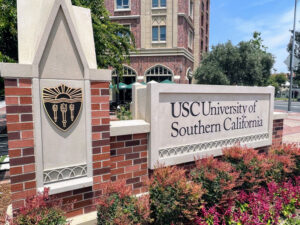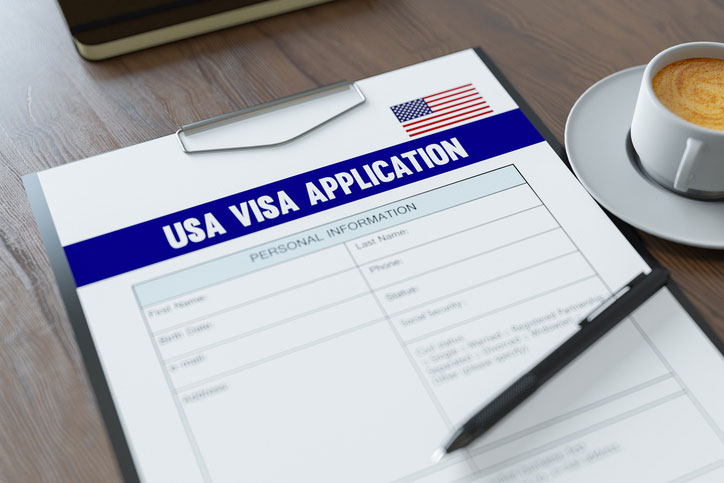Reviewed by Ashley (Brendle) Rey, MBA

Earning an MBA from an American university is held in high regard the world over. And many of the business schools that consistently dominate the lists for top MBA programs worldwide are found right here in California.
Having a class of MBA programs that people would cross oceans to access says a lot, but it’s not the only reason it still means so much to earn a business degree in the states. The fact that the US is also the largest single economy in the world, also makes it a natural place to study the science of business, no matter what country you call home.
If you are going to pursue an MBA in the United States, California is one of the most natural places to do it for many of the same reasons:
- If California were separated from the U.S., it would still be the 4th largest economy in the world
- California is home to headquarters of 8 Fortune 100 companies and more of the Fortune 500 than any other U.S. state
- California is the most diverse state in the United States, with no one race or ethnic group constituting a majority of the population
A master of business administration is a tough degree for anyone to earn. Coming from another country adds an extra layer of difficulty to the process. But this guide will make it a whole lot easier. Here we’ll address every question that comes up for international students just like you, providing workable solutions, tips, and work-arounds to make the process streamline and manageable.
Why California Is the Best Place for International Business Students To Earn an MBA
 California business schools come with all the advantages of any other university in the United States, plus the special programs and accommodations they offer international students.
California business schools come with all the advantages of any other university in the United States, plus the special programs and accommodations they offer international students.
California is a prime location for students from the Pacific Rim seeking Master of Business Administration degrees.
- California is well-connected to Asia, with four major airports offering direct flights to 23 different Asian cities
- With the most diverse population in the United States, California offers students from anywhere with cultural touchstones, whether it’s food from home or local businesses catering to your tastes
- For the same reason, California universities typically have better support and assistance for international students
- Since many graduates of California MBA programs will land in major West Coast companies, the contacts you make at these schools will be valuable in your future business dealings
According to data from the East-West Center in 2020, three quarters of all international students in California are from the Indo-Pacific region, almost 124,000 of them.
California business schools have a long history of high-levels of international student admissions.
You don’t have to be from a Pacific Rim country to take advantage of a California business education. Universities here host students from hundreds of different countries from around the world. And as a hotspot for the technology, agriculture, and entertainment industries, California itself has cultural connections all around the globe. The cross-cultural exchange over the entire history of the state makes it a place where you can find communities of almost any national origin.
So it’s no surprise that California is the top destination for international students in the United States, according to a 2023 article in the Los Angeles Times.
Defining the Challenges of Earning a California MBA as an International Student

Although an American MBA is a very wise long-term play for any international business student, it’s not without some real challenges.
The most significant of those is getting a student visa for admission to the United States. Although many foreign nationals have various entry options based on their country of origin, the only way to gain access to an American business school is to get a student visa.
Visa requirements aside, international applicants for California MBA studies also have to deal with issues like:
- Transcript translation and evaluation to verify qualifications and perquisite knowledge
- Overcoming difficulties learning in a non-native language
- Adjusting to American cultural norms both in the classroom and in day-to-day life
- Meeting admissions standards with Americanized expectations of business and life experience
- Taking standardized entrance exams such as the GRE or GMAT in areas with few testing centers
Long before applying to an American MBA program, you’ll need to begin laying the groundwork for a successful student experience in the U.S.:
English Language Skills
For most international students, English is a second language. But it’s the first language of business, and the only way to absorb ideas and connect in the classroom.
Financial Support
International students are required to provide proof of sufficient financial resources to complete studies. Typically, this means a statement from your financial institution that shows there is enough funds to cover registration fees, tuition costs, housing, books, and other miscellaneous expenses for at least one year of study.
Cultural Adjustments
American culture can be found all over the world today. That’s thanks in large part to California. Though pop culture movie references are familiar to people around the globe, Hollywood isn’t real life. That means international students almost always experience some level of culture shock when they arrive in the United States to study.
Academic Qualifications
Business schools today take a holistic view of evaluating applications. But strong quantitative and analytical skills are always front and center. Your education will have to prepare you for advanced American collegiate studies—as well as the competitive, Socratic American business school classroom.
None of these things are skills or qualities you can pick up overnight. They may represent the keys not only to getting into the California business school of your dreams, but also successfully completing your MBA program there.
Preparations International Students Need to Make Before Applying to a California MBA Program
Preparing to apply to a California MBA program begins years before you plan to earn the degree.
Admissions are competitive, and schools have strict standards for applicants. Those standards are even more difficult for international students to meet.
Even if you have been educated in line with the expectations of admissions committees, it can still be a challenge to prove it. Transcripts from foreign schools need to be translated and sometimes interpreted to find equivalent courses from American college curriculum. Taking standardized admissions tests can be more of a challenge in some countries. And expectations for extracurricular activities and leadership experience must be considered through a cultural lens that doesn’t always align precisely with American expectations.
You’ll need to work harder to ensure you meet the standards in all these areas and more.
Make Sure Your International Academic Standards Hit the Marks
Like anyone applying to an MBA program, you will need to have a bachelor’s degree.
The most widely accepted bachelor’s degrees are those from American universities. If it’s within your capabilities and financial reach, your best shot may be to start your education in the United States at the undergraduate level.
But any California business school that accepts international students will also accept international bachelor’s degrees, with various restrictions. Some, for example, will not consider the kind of three-year degree programs that are common in India, Europe, and Australia. Some will accept those programs on a case-by-case basis; others may require that you have an additional year of college-level studies first.
Those studies, whether in addition to or as part of a bachelor’s program, will need to line up generally with the typical set of skills and knowledge found in American undergraduate courses.
Consider Your Strategy for the GMAT or GRE Standardized Admissions Tests
For decades, the standard measure of an applicant’s qualitative and reasoning skills have been the standardized GMAT and GRE entrance exams.
Both exams are computer-based. While the GMAT is now available in an online version introduced during the pandemic, it’s not available in all countries due to regulatory restrictions. The GRE is also available in an at-home version, but again, not in every country.
Standardized tests pose language challenges – both in comprehending the questions and in free-form writing sections.
Both exams are only offered in English-language versions. Scoring is focused on reasoning and analysis rather than grammar and spelling, but if your English isn’t up to the challenge of getting your analysis across clearly, it could reflect in your test scores.
International students can benefit from a trend in MBA admissions that is occurring at California universities as well as many others across the country, however. Fewer and fewer schools require GMAT or GRE score submissions.
Although they may still be considered if you choose to take them, business schools today more frequently encourage students to show evidence of other academic and professional accomplishments instead, such as:
- A strong record in other graduate or undergraduate studies, particularly in analytical or quantitative courses
- Work experience in roles with analytical or quantitative functions
- Professional certifications in fields that rely on strong business analytics skills, such as in accounting or finance
If you do choose to take the GMAT or GRE, it’s wise to go through several practice exams to ensure your language and analytical skills are all up to the challenge.
Make Sure Your English Language Skills Are Up to The Challenge of Classroom Discussions
Language looms large in your plans to obtain an MBA from a California business school. All instruction will be in English. Every school has strict standards for your English language capabilities as part of the admissions process.
That’s a skill you can’t develop overnight. If you are not from a country where English is regularly spoken, it will take a lot of effort to build your skills to the point where you can score high enough to apply to an American business school.
Not every school accepts every test, so you need to make sure the one you take is recognized by the schools you are applying to.
Each test has its own scoring system, focus, cost, and testing process:
Offered by: Educational Testing Service (ETS), the same organization that offers the Graduate Record Exam
-
TOEFL tests are the most widely accepted by California business schools. They are designed for academic purposes and focus on reading, writing, listening, and speaking skills in that context. There are, however, two different TOEFL exams with different scoring systems:
- iBT (Internet-based Test)
- PBT (Paper-based Test)
- Most California business schools prefer the iBT but may accept paper-based tests; the speaking portion of the test is recorded and sent in for scoring
Offered by: British Council, IDP, and Cambridge English
- IELTS is the second most widely accepted English skill test among California B-schools. Almost all prefer the Academic version of the test, not the General Training version.
- Tests listening, reading, writing, and speaking in English through live video conference
Offered by: Duolingo, a popular online and app-based language training system
- A surprising and popular new entry on the English testing scene comes from Duolingo. The computer-adaptive test adjusts question difficulty based on your answers as you go. It includes a video interview and writing sample portion that are ungraded, but can be shared with the business schools you’re applying to.
- Less expensive and shorter than the TOEFL or IELTS exams
Offered by: Cambridge University
- Cambridge has tests at the A, B, and C levels, with other grades of difficulty within those structures. Most California business schools prefer the C1 Advanced test level. However, many now accept results reported on the Cambridge English Scale, which delivers a numeric result that can be matched to different test levels. Reading and use of language, writing, listening, and speaking skills are tested, with speaking conducted face-to-face with an examiner.
- Cambridge Assessment scores do not expire, making them a good investment for multiple applications or qualifications over time
Offered by: Eiken Foundation of Japan
- Eiken tests are ranked and scored similar to the Cambridge Assessment. The tests is primarily offered to Japanese students in Japan, where it is conducted three times per year. It’s a two-stage exam, with vocabulary, reading, listening, and writing evaluated first. Only after passing in those subjects will candidates move to the speaking portion of the exam.
Getting a Background in Volunteering and Extracurricular Activities To Impress California Business School Admissions Committees
One of your biggest adjustments will be learning how to create a strong application story that will appeal to admissions committees. This can involve developing an understanding of American culture, especially business culture.
International applicants have one automatic bonus when it comes to applying for California MBA programs: you will almost certainly be considered a good choice for diversity.
California business schools thrive on diversity, so that’s an asset. But they also look for candidates who are a good fit for their culture and have strong leadership potential.
That’s typically something that applicants demonstrate with extracurricular activities. These are hobbies or volunteer efforts that show your commitment, values, and skills.
Not all cultures value volunteerism, however, and not all nations have a tradition of volunteering or many opportunities to do so.
Many California MBA programs – particularly Executive and Professional MBAs – recommend a certain level of professional business experience.
If that’s the case in your home country, you have an opportunity instead to show some initiative in finding extracurricular activities outside the norms. There are various international volunteer programs, such as the Red Cross/Red Crescent, as well as the United Nations Volunteer program. These can offer a chance to volunteer for citizens of any country.
Even more impressive are candidates who start their own organizations for public benefit. Finding ways to contribute to your community and to explore your personal interests, no matter what form that takes, is the best way to build your credentials for American admissions committees.
A Complete List of California Business Schools that Accept International F-1 Visa Students

International students have fewer choices than American students when it comes to MBA programs they can apply to. There are 86 universities that offer MBA degrees in California. Not all of them accept foreign students, however.
In order to acquire an F-1 or J-1 student visa, the school you attend has to be a SEVP (Student and Exchange Visitor Program)-approved school. This means they can generate an I-20 or DS-2019 form for the U.S. State Department, which is essential to your visa being issued.
Not only does the school have to participate in SEVP, but the specific MBA program you want to attend must qualify under the terms of the program. F-1 visas require full-time, on-campus attendance. A full-time course load is defined by each school. In general, however, part-time MBAs and online or hybrid programs may not qualify.
F-1 Versus J-1 – The Two Visa Options Most Common for International MBA Students
 Almost all international students matriculating in California colleges for graduate business degrees enter on an F-1 student visa. This is a nonimmigrant entry visa that allows full-time study at participating American universities, as well as some on-campus employment, and potentially off-campus employment (such as internships) with the right documentation.
Almost all international students matriculating in California colleges for graduate business degrees enter on an F-1 student visa. This is a nonimmigrant entry visa that allows full-time study at participating American universities, as well as some on-campus employment, and potentially off-campus employment (such as internships) with the right documentation.
The other student visa option is the J-1 nonimmigrant exchange visa. This is a broader program that covers many kinds of temporary visitor exchange like high-school students, research scholars, professors, healthcare professionals, and au pairs.
For business students, a J-1 requires enrolling in an overseas business school or government sponsorship that has an exchange program with an American university. You can be allowed to study in the United States for a limited period, usually less than is allowed on an F-1, to study as part of that formal exchange program.
Some California universities do have such exchange programs. UCLA’s Anderson School of Management, for example, reports that about 5 percent of their international MBA students arrive on a J-1 visa.
The primary advantage to the J-1 over the F-1 is that spouses and dependents are allowed in on J-2 visas, which allow them to legally work while in the U.S. The spouse of an F-1 visa recipient is only eligible for an F-2, which does not allow employment.
The F-1, on the other hand, offers CPT (Curricular Practical Training) and OPT (Optional Practice Training) which can have advantages in internship placements and in finding post-graduation employment in the U.S.
University of California, Los Angeles
John E. Anderson School of Management

University of California at Berkeley
Haas School of Business

University of California, Davis
School of Business

University of California, Riverside
School of Business

University of California San Diego
Rady School of Management 
University of California-Irvine
Paul Merage School of Business

California Polytechnic State University, San Luis Obispo
Orfalea College of Business

San Diego State University
Fowler College of Business

San Jose State University
Lucas College and Graduate School of Business

California State University, East Bay
College of Business and Economics

California State University, San Bernardino
Jack H. Brown College of Business and Public Administration

California State University Long Beach
College of Business

California State University, Sacramento
College of Business

California State University, Chico
College of Business

California State University San Marcos
College of Business Administration

California State University Channel Islands
Martin V. Smith School of Business and Economics

Sonoma State University
College of Science Technology and Business, School of Business

California State University, Stanislaus
College of Business Administration

San Francisco State University (SFSU)
Lam Family College of Business

California State University Monterey Bay
College of Business

Stanford University
Graduate School of Business

University of Southern California
Marshall School of Business

Pepperdine University
Graziadio Business School

Chapman University
Argyros College of Business and Economics

Claremont Graduate University
Drucker School of Management

Sant Clara University
Leavey School of Business

Loyola Marymount University
College of Business Administration

University of San Francisco
Masagung Graduate School of Management

University of San Diego
Knauss School of Business

Woodbury University
School of Business

Golden Gate University
Ageno School of Business

University of the Pacific
Eberhardt School of Business

Meridian University
College of Business

Dominican University of California
Barowsky School of Business

La Sierra University
Tom and Vi Zapara School of Business

California Lutheran University
School of Management 
University of Redlands
School of Business and Society

University of La Verne
College of Business

Fresno Pacific University
School of Graduate and Professional Studies

Point Loma Nazarene University
Fermanian School of Business

DeVry University
Keller Graduate School of Management (campus locations across CA)

Biola University
Crowell School of Business 
Westcliff University
College of Business

Alliant International University
California School of Management and Leadership (CSML)

University of the West
College of Business

Angeles College
College of Business

Azusa Pacific University
School of Business and Management

West Coast University
College of Business

California Baptist University
Dr. Robert K. Jabs School of Business

National University
School of Business and Economics

California Institute of Advanced Management
College of Business

Hope International University
College of Business and Management

Simpson University
College of Business

Sofia University
College of Business

William Jessup University
School of Business

Humphreys University
Department of Graduate Studies

California Miramar University
School of Business

Antioch University
College of Business

Lincoln University
College of Business

Life Pacific University
School of Arts and Sciences

Haven University
School of Business

Notre Dame de Namur University
School of Business and Management

Touro University Worldwide
School of Business and Management

San Francisco Bay University
School of Business

Bethesda University
College of Business

America Evangelical University
School of Business

United States University
College of Business and Technology

What Are the Advantages of Public vs Private Schools for International MBA Students?
 Choosing between a private or public university is not usually a particularly important consideration for international students. The primary advantage to public universities is the reduced tuition rates that in-state students qualify for. International students, by definition, will not qualify for those rates. The out-of-state tuition rates that international students would pay at public universities tend to be comparable to the cost of attending a private university.
However, you may find that private universities offer more financial supports specially for international students. Some extend scholarship eligibility to all business students, not just Americans.
Private schools often have a more elite reputation because of those costs. In a field like business, where reputation is critical, that can be a self-reinforcing advantage. They are independent of government and may be run by religious organizations. In many cases, they have smaller class sizes and fewer students per instructor.
On the other hand, state university systems may have additional resources to offer international students simply due to their size. The California State University system, for example, has an entire website devoted to international student admissions which offers details for all 23 CSU campuses around the state. It’s an easy place to find answers and resources.
Choosing between a private or public university is not usually a particularly important consideration for international students. The primary advantage to public universities is the reduced tuition rates that in-state students qualify for. International students, by definition, will not qualify for those rates. The out-of-state tuition rates that international students would pay at public universities tend to be comparable to the cost of attending a private university.
However, you may find that private universities offer more financial supports specially for international students. Some extend scholarship eligibility to all business students, not just Americans.
Private schools often have a more elite reputation because of those costs. In a field like business, where reputation is critical, that can be a self-reinforcing advantage. They are independent of government and may be run by religious organizations. In many cases, they have smaller class sizes and fewer students per instructor.
On the other hand, state university systems may have additional resources to offer international students simply due to their size. The California State University system, for example, has an entire website devoted to international student admissions which offers details for all 23 CSU campuses around the state. It’s an easy place to find answers and resources. Different Regions in Californias Offer Unique Benefits to International Business Students
California’s multicultural population is one of the best selling points for international students attending business programs here. In major cities like San Francisco, San Diego, or Los Angeles, you can find ethnic and cultural enclaves from pretty much every part of the globe. Even in smaller towns, particularly college towns, it’s common to find both immigrants and students who share your taste in culture, foods, and entertainment.
Yet many international students also choose California exactly because it is not just like home. American business and society have their own appeal.
Can International Students Earn an MBA Online From a California Business School?
 The answer is complicated!
The answer is complicated!
Because international student visas require full-time attendance, degrees that are entirely online do not qualify. On the other hand, since you don’t need to be physically present in the country for programs that are offered 100% online, you don’t technically need a visa. That leaves it up to the university in question to accept international students for fully online MBAs — some do, and some do not.
It’s more common for online degrees to include some on-campus attendance, however. If a program is hybrid, with both online and on-campus commitments, you probably will not qualify.
The exception is for online degrees that involve an on-campus intensive that requires a few days or a week, all at once. It is possible to get an F-1 visa even for such a short visit if you will be attending class on a full-time basis during your visit.
There, again, the decision falls to the school as to whether they want to process the paperwork for students on such a short visit. You will find at least a handful of programs, like the OMBA (Online MBA) at USC Marshall, which do.
Location can also play a role in the kind of network you develop and the industry expertise you can tap into.
Northern California/Bay Area Business Schools
A school near Silicon Valley could offer advantages in developing contacts in the tech industry and with venture capital groups active in the Valley. Heavy hitting programs like Stanford and Berkeley Haas attract big name investors and entrepreneurs, with tech, biotech, and finance in focus. Yet there are also plenty of smaller and more boutique business schools in this region, such as the private University of San Francisco’s Masagung Graduate School of Management, a rigorous Jesuit program emphasizing social justice, cultural understanding, and diversity… strong selling points for international students.
Los Angeles Business Schools
Entertainment and international trade contacts are easier to make in the LA area. This is also a focal point for graduate schools of business that accept international students, from UCLA and USC down to more tailored programs like Loyola Marymount or Biola University. As a major port as well as a destination for tourists and immigrants from all over, there is a strong mix of businesses in LA. With many foreign-born professionals and businesspeople in these industries, it can be easy to make strong networking connections here. On top of that, LA has every kind of cultural hallmark from almost any country you can think of… from Koreatown to the Fairfax District. It’s a place where you can study the best in American business yet still feel at home.
Central Valley Business Schools
Agriculture and export are hot topics for MBA programs in the Central Valley. UC Davis, which ranks as one of our top schools for international MBA students, is among them. These schools tend to be in smaller towns and cities. They showcase a side of California that many international students may not be aware of. Some Central Valley MBA programs, like the private Fresno Pacific University, are taught from a Christian perspective and worldview, which may present an especially safe option that even non-Christian students prefer. Yet because the Central Valley runs up and down the spine of the state, they frequently also offer inroads to big centers of industry and technology on the coast.
San Diego Business Schools
San Diego can seem like a downsized Los Angeles at times, but it’s a unique business environment that represents many advantages for international students pursuing an MBA in California. While it has all the diversity of culture that LA brings to the table, it has a more intimate environment with small, unusual startups and a focus on tourism, military, and biotech business. It’s a great place to develop truly collaborative relationships at unique schools like DeVry, Alliant International’s California School of Management and Leadership, and California Miramar University.
So your best choice of MBA degree may come down to where the school is located. Many California business schools are in cities that have a terrific combination of both American and international cultures. It’s worth exploring different neighborhoods and cultural experiences that are available nearby the schools you are considering.
Ideally, You Get a Chance to Visit the Business School You’re Interested in Before Applying
Although you can do a lot of valuable research online before selecting the schools you want to apply to, there is nothing like visiting and getting a tour of your options in person before you make your choice.
A campus visit can be particularly valuable for international students looking at schools in smaller California towns, which may not have the multicultural feel of big-city business schools.
This is clearly a more difficult process for international students than domestic applicants. You have to get a completely separate visa, a B-2 visitor visa, or be from a country eligible for the Visa Waiver Program. International travel is also significantly more expensive than visiting domestically.
On the other hand, the most supportive California schools for international MBA candidates now offer virtual tours or online meetings with student ambassadors. This can give you some of the same exposure to the culture and perspectives that you would get from an in-person visit, without the additional costs and visa hassle.
Strong School Support Makes All the Difference for International Business Students Pursuing MBAs in California

One of the most important considerations will be the level of support that different schools provide to international students. You will find a wide range of offerings in international student support, from fully-staffed international student services offices with staff who speak your language, to a poorly maintained website offering broken links and outdated tips for maintaining your visa.
This is a place where the best business schools in California for international students differentiate their offerings for international students. A strong support system will offer:
- Clear instructions for both your MBA application and filing for your visa
- Comprehensive information about arrival, customs clearance, and checking in with the school
- A solid orientation designed specifically for international students to help identify local resources and explain campus life
- One-to-one advising or mentorship, including with current international students
- Pointers to social activities and cultural events to help you make connections in the United States
Some schools, like DeVry, even walk you through basics for new arrivals like opening an American bank account.
More important, the best business schools in California for international students look for the questions behind the questions, and try to answer those as well. SISS (Services for International Students and Scholars) at UC Davis, for example, helps you understand the challenges involved in finding permanent work in the United States after graduation. The California Institute of Advanced Management puts out an International Student Handbook that doesn’t just cover visa maintenance and travel arrangements, but also gives you perspective on life and housing in the LA area.
Considerations for International Business Students During the Application Process
MBA programs, and particularly high-caliber California business school MBA programs, are very selective. They receive far more applications than they can accept. They will take only the very best students, the ones they believe are most likely to succeed and achieve their goals.
This can make the admissions process the greatest challenge for international students seeking an MBA in California.
Early applications are recommended for international applicants regardless of which program you are applying for. This is because:
- There are more potential points of delay in the process
- More paperwork, and more time required to process it
- Once a decision has been made, additional time is required for a visa to be issued
Many schools publish different deadline dates for domestic and international applicants. On the other hand, schools that have frequent rolling admissions can offer an advantage for international students. They eliminate some of the pressure of deadlines, since a delay will only last for a couple of months till the next start date rather than an entire year.
International Student Clubs Provide Drop-in Opportunities To Connect and Make Friends

Just like lessons in business are won through hard-fought experience in the real-world, you can absorb a lot of valuable information about handling American business education from those who have come before you. The mutual support that comes through international student groups and alumni organizations is invaluable.
Most California universities that accept F-1 and J-1 visa students have international student clubs and associations on campus.
Many also have clubs specifically for students from particular regional or national backgrounds, putting you in touch with people that share your culture and language.
The best universities have student groups that are even more niche than that, specifically designed for international business students. Examples like the Haas Asia Business Club, or the International Student Business Association at Irvine go even further toward putting you together with people who understand you and know how hard you had to work to get where you are.
Step-by-Step Process for Attaining an International Student Visa to Attend Business School in California

Where international students need the most support from their universities is in getting through the process of obtaining and maintaining a visa to study in the United States.
Although the details are important and time-consuming, this is nothing that a future MBA shouldn’t be able to handle. California business school and university admissions advisors for international students are experts in working through any sticking points.
This process starts only after you have applied and been accepted.
- Indicate your acceptance of the enrollment offer, and state your intent to register as required by the college
- This may include submitting a financial statement confirming your ability to pay
- After receiving an I-20 form from your university, submit a DS-160 Online Nonimmigrant Visa Application
- Schedule an interview at your local U.S. Embassy or Consulate.
- This may involve a significant wait time, particularly during the summer, so don’t delay. If you are on a delayed entry arrangement, you can obtain the visa up to a full year before you begin studying.
- At your interview:
- Bring your passport, with a validity date at least six months beyond the expected period of stay in the U.S.
- Bring the DS-160 confirmation page and application fee
- Bring your I-20 form
- You may need to also produce transcripts, diplomas, or GRE/GMAT scores to satisfy the consular officer of your intent to study
- Be prepared to answer questions about your finances, future plans, and family, if any, in the United States
- After receiving your visa, not before, you can make travel arrangements to California
- You may arrive up to 30 days before starting class. On arrival, you must obtain an I-94 form and present it to the university to complete your check-in.
Some schools will even provide you with coaching to ensure you answer immigration questions at your port of entry without raising any red flags.
The Department of Homeland Security Study in the States website offers free resources that explain the nonimmigrant student visa process. However, this is also an area where the right college can offer extensive support and assistance. For you, it’s probably your first time negotiating the complex bureaucracy of U.S. Citizenship and Immigration Services (USCIS). For a popular university with strong international student support, their staff has processed thousands of similar applications. They can take you through exactly the right steps to make it a smooth and streamlined experience.
Making the Most of Your Opportunities at a California MBA Program
After completing the long series of steps it takes to get into a California business school as an overseas student, you’ll be more than ready to get started on your MBA program.
In some ways, not having the distractions and obligations that come with an existing friend group means international students have the freedom to concentrate and excel in their MBA studies.
Throughout your studies, you will have to follow special procedures for:
- Traveling internationally while still on your F-1 visa
- Ensuring you have sufficient identification on you while in the U.S.
- Bringing over a spouse or dependents, who will require their own visas
- Following employment restrictions that are a condition of entry
Negotiating MBA Internship Placements as an International Student
International MBA students are typically here on F-1 student visas. That’s a type of visa that prohibits holders from taking any off-campus job while they are in the United States (with some exceptions).
This can create challenges in MBA programs that include internships placements as part of the course of study. Although many internships are not paid positions, they often fulfill the legal definition of employment. That can mean they exceed the terms of the visa.
Fortunately, there are ways to legally perform an outside internship with the assistance of your university.
For J-1 students, this can be accomplished through the Academic Training exception. It allows you to work in a position related to your field of study for up to 18 months.
For F-1 students, this happens through CPT, or Curricular Practical Training. With some exceptions, you must have held your F-1 for a year prior to applying for CPT. One-year MBAs often fall into that exception category, but you’ll need to check with each school to find their policy.
The procedures for obtaining CPT are complicated, so this is an area where choosing a business school with strong international support really pays off. It’s particularly important because your CPT time can impact your OPT (Optional Practical Training) eligibility after graduation. A good advising department will make sure you can both fulfill any internship requirements for your degree and preserve your post-graduate options.
Using Your California MBA as a Launch Pad to a Stateside Position

Earning an MBA is never done for its own sake. It is a credential you get to help you achieve bigger career goals, either in your own country or by emigrating to the United States.
As a native of your own country, you’re in the best position to understand how exactly an American MBA may help your career prospects. But there are many international students who look to business training in the United States as the first step toward working at an American company.
For many international students, an MBA from a California university opens the door to long-term employment in the United States on an H1B visa.
Of course, simply attending a university in California that has a strong reputation and ties to the industry you are interested in is a great way to get started. You’ll have unparalleled networking opportunities with alumni who may hold positions at companies you’re interested in working for, and your professors might even provide the recommendations that help you land that position.
But one of the best opportunities you’ll have for getting started in a professional position after graduation comes through the OPT (Optional Practical Training) available on an F-1 student visa.
Optional Practice Training Can Be Your Ticket to a Successful Job Hunt
OPT offers up to 12 months of employment in the United States for each year of study after you complete your MBA. In fact, you can begin while you are still studying, although you are restricted to 20 hours per week while school is in session.
Your authorization starts with a recommendation on your I-20 form from your school. You will then file an I-765 Application for Employment Authorization with USCIS. You can submit that application even without having a specific job lined up, although you will need to begin work before the original expiration date of your visa.
OPT employment must align with your field of study. As a business major, however, that opens up pretty much any kind of office or management work in any industry.
If a year seems a little short, you are eligible for a 24-month extension if your MBA was STEM-designated. That’s a total of three valuable years of employment, during which you can apply for an H1B employment visa or seek immigrant entry options while still building your career.
There are plenty of international students who are happy to take their first-rate education home and dominate business in their own country, too, of course. The best thing about an MBA from a California business school is that it opens up an entire world of possibilities.
